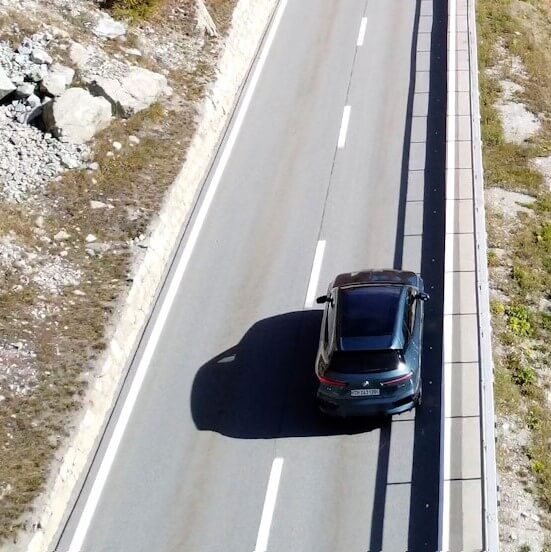
Also in today's EMEA regional roundup: Telecom Italia sticks to Plan A; Three's Q3 revenues rise, but so does capex; Orange teams up with towerco Vanu for Côte d'Ivoire coverage.
Swisscom has hooked up with BMW to enable the German carmaker's iX model to connect to Swisscom's 5G network, even if the driver has left his or her smartphone at home. It does this through an eSIM, which connects to Swisscom's network via the vehicle's external antenna. Figure 1:
 (Source: Swisscom)
(Source: Swisscom)The CEO of Telecom Italia (TIM), Pietro Labriola, appears to be stubbornly sticking to his fixed-line infrastructure spinoff plan involving state lender CDP and broadband provider Open Fiber, despite opposition from Italy's new right-wing government. As Reuters reports, Labriola told a conference that the sale of TIM's network would allow the operator's "services operations to compete through the market." (See CPD may delay TIM bid until after Italy's election and TIM soldiers on amid political turmoil.)
Third-quarter revenues at UK mobile operator Three rose 7% year-on-year, to £656 million ($752 million), while its active customer base grew by almost 700,000, to 10.3 million. Capex increased to £244 million ($279 million), partly driven by 5G rollout. In a statement, CEO Robert Finnegan said: "Momentum across Three UK has continued in Q3 … However, our returns are below our cost of capital and EBITDA remains below capex. Therefore, for Three to continue investing in the UK's digital infrastructure, structural change is needed to the industry."
Kuwait-based Zain saw third-quarter EBITDA (earnings before interest, tax, depreciation and amortization) rise 2% year-on-year, to 171 million Kuwaiti Dinar ($555 million), on consolidated revenues that were up 15%, to KD441 million ($1.4 billion). Zain now has 52 million active customers across its various markets.
Nokia is to provide its 7250 IXR (interconnect router) platforms with 400G-enabled interfaces to Africa Data Centres to enable it to offer MEF 3.0 certified interconnection services to its customers. In addition, Africa Data Centres will deploy Nokia's Network Services Platform (NSP) to automate the deployment and management of connectivity services.
Orange Côte d'Ivoire and towers company Vanu have joined forces to provide connectivity in rural areas of the African country as well as to Orange Côte d'Ivoire Group's subsidiaries in Burkina Faso and Liberia. The project will begin with 1,070 sites, 700 of which will be in Côte d'Ivoire, 170 in Burkina Faso and 200 in Liberia.
OneWeb, the satellite connectivity company co-owned by the British government and India's Bharti Global, has signed a deal with Airtel Africa to bring OneWeb's services to government and enterprise customers across wide swathes of the continent.
Sky's Now streaming service is now available on Google TV devices (running on the Android TV OS), which include Chromecast with Google TV and eight of the UK's biggest smart TV brands.
Essex County Council in eastern England is to provide an additional £700,000 ($802,000) in funding to help hard-to-reach residents and businesses to subsidize the cost of bringing gigabit broadband to their premises under the UK government's Gigabit Broadband Voucher Scheme (GBVS). Combined with funding from the GBVS, eligible residents will be awarded up to £8,500 ($9,739) towards a gigabit-capable connection, while businesses can receive up to £15,000 ($17,187).
The European Commission has opened an investigation into Microsoft's proposed acquisition of games developer Activision Blizzard. The Commission is concerned that the deal may reduce competition in the video games market. In particular, the Commission is worried that, by buying Activision Blizzard, Microsoft may restrict access to Activision Blizzard's console and PC video games, especially to blockbuster games such as Call of Duty.
— Paul Rainford, Assistant Editor, Europe, Light Reading
Read more about:
EuropeAbout the Author(s)
You May Also Like










